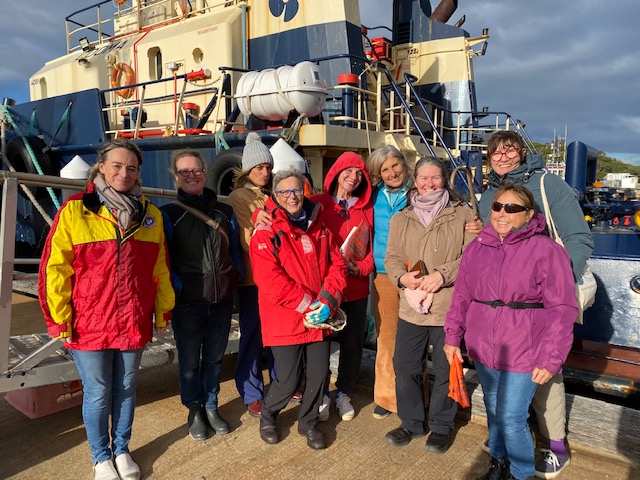
In 2022, these women gained their sea legs as SisterShip Training participants. Photo: Jackie Parry.
When Jackie Parry first took to the high seas, she noticed several things – one being that there weren’t always women around.
She set out to change that, and now runs SisterShip Training with her husband Noel through an organisation offering training courses and accreditation in the maritime industry, based on the Sapphire Coast of NSW.
“I do train men as well, they’re not excluded,” Ms Parry said.
“But I learned that when I got into the maritime world in my early 20s, and then later after a break, how much of the training was geared towards men.
“I started to run workshops for women and I had no idea how it would go – but it went down so well.”
One of SisterShip’s programs is the SisterShip CareerShip program, funded through a grant scheme by the Trade Pathways Program – Training Services NSW.
Jacqui van Teulingen, a consultant with the NSW Department of Industry at the time, first encountered SisterShip when the organisation received grant funding for the SisterShip CareerShip program and she has continued to work with Ms Parry through her consulting business.
Ms van Teulingen said the SisterShip courses were helping to increase women’s participation on the waves.
“Jackie is really focused on breaking down gender barriers and building confidence in women, to help them learn that they can do this themselves,” she said.
“In a male-dominated industry, she believes there is an approach to career development here in the maritime sector that is for women.”
Participants in the third round of the SisterShip CareerShip training are preparing to start their course in the coming weeks.
“Part of the Trade Pathways Program is to bring women together and to help them connect with other people in the industry,” Ms van Teulingen said.
“We have an event with P&O Cruises coming up soon, so they can hear from other women who have been in the industry and connect the people who have done this training with the people who can provide them with jobs.”
Ms van Teulingen said that beyond teaching women skills needed for the maritime industry, the SisterShip program showed demand for the industry.
“If you want to have a career in the maritime industry, you often have to go to Sydney for training,” she said.
“We’ve got all this knowledge, but there’s no-one bringing it all together and sharing it.
“Showing that there’s a demand for maritime training here is the first step in getting TAFE or a university or whatever to pick up maritime qualifications.
“That would see us having education and training pathways into this industry.”
Several participants in one of the SisterShip courses had kept working on the water, Ms Parry said.
“It is always great to see participants come back and tell me they’re starting to set up their own maritime business, or work on a maritime business or go on to more training with me,” she said.
“We’ve got one participant whose looking at becoming a marine electrician, and another one runs a mussel farm and is looking at getting her skipper ticket.”
For Ms Parry, being able to teach others the skills needed starts with the basics.
“I remember very, very clearly what it’s like stepping into the maritime world, not knowing the front end of a boat from the back end,” she said.
“I take it very seriously that you see women and some men – most of them complete beginners – realise that they can do this work.
“Watching that transformation is an absolute privilege.”
Further information can be found on the SisterShip Training website.







